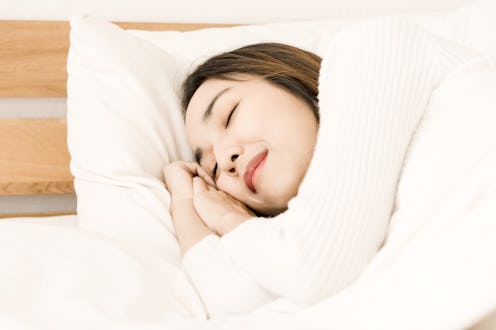Life
You Need To Try This New Hack For Measuring Out Your Sleep Hours

"Right, if I fall asleep within the next 60 seconds, I can get seven full hours of sleep!" said everyone everywhere. Bad news: you're doing it wrong. According to new sleep research, giving yourself thismuchtime to fall asleep and catch quality ZZZs ain't working; and if you really want to recharge your battery, you need a better "sleep opportunity" than that. Not familiar with the term? I'll explain.
Your "sleep opportunity" is the number of hours you give yourself the chance to sleep — and it has to be under the right conditions, meaning you're in bed with your eyes closed, and you've unplugged from technology. If you log off Instagram at 2:00 a.m., curl up under the blanket, and set an alarm for 8:00 a.m., your sleep opportunity is six hours. This doesn't mean you'll sleep the entire six hours; it means you have the opportunity to sleep. Get it? Sleep opportunity?
Here's why it's so important. If you get into bed at the reasonable time of 10:00 p.m. but spend the next hour and a half scrolling through Chrissy Teigen's Twitter feed, you're denying yourself another hour and a half's worth of sleep opportunity. So, when you wake up the next morning exhausted with your eye bags on fleek, don't complain to all your friends, "WTF. I went to bed at 10."
In his new book Why We Sleep, author and UC Berkeley sleep scientist Matthew Walker stresses the important of an adequate sleep opportunity. Walker writes that most of us have a sleep opportunity of just five to six-and-a-half hours, which means anywhere from four to six hours of real sleep. Four to six hours! Do you know what such a severe lack of sleep will do you to? That's the kind of person who walks out of the house without pants on. Not that I know from experience or anything...
Walker himself commits to an eight-hour sleep opportunity, so even if he takes awhile to fall asleep, he should still wake up fairly rested and in the right frame of mind to put on pants before leaving for the office.
It's important to understand the significance of quiet rest, even if you're not asleep. This is where your sleep opportunity becomes even more important. There's a notable difference between laying in bed and watching Kim Kardashian doing her own makeup on her Instagram page (guilty!), and laying in bed in the dark with your eyes closed and all devices put away, resting quietly and letting your mind and body unwind.
You don't need me to tell you the consequences of using your phone before bedtime, but I'm going to anyway. Studies have shown that the blue-and-white light emitted by phones, laptops, and other gadgets stops our brains from releasing melatonin, a hormone which signals to our bodies that it's time for bed. This can make it take longer to fall asleep, thereby compromising your sleep opportunity further. For this reason, you should avoid these devices at least an hour before your sleep opportunity starts.
By doing this, and spending time resting — even if you're not sleeping yet — your body reaps the benefits. Although that deep sleep (read: REM) is where the real magic happens, yes, rest benefits your body too. Science sometimes refers to this state of being as "quiet wakefulness." When you do it, you give some of your neurons a chance to rest, and your muscles and organs relax. Quiet wakefulness can also help combat stress and improve mood, alertness, mental clarity, motivation, and creativity. If you're a pro at totally clearing your mind and can get yourself into a meditative state, all the better: meditation has been found to help manage anxiety, depression, high blood pressure, headaches, and sleep problems (hello!).
You already know sleep is important, but are you really taking it seriously? Give yourself not only enough time to sleep, but enough time to become relaxed enough to fall asleep. And remember, if you're laying in bed staring at the wall, yes, you're still helping your body out.
Happy snoozing!